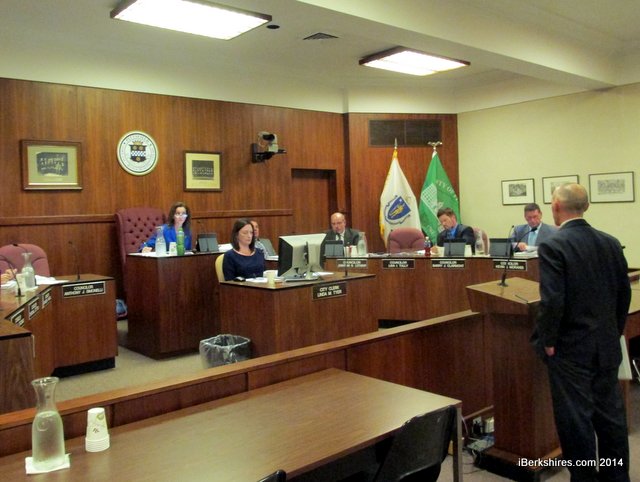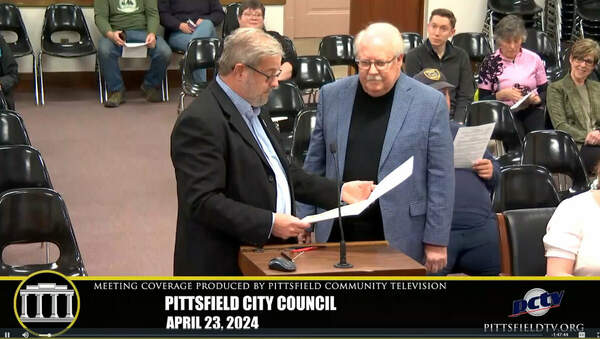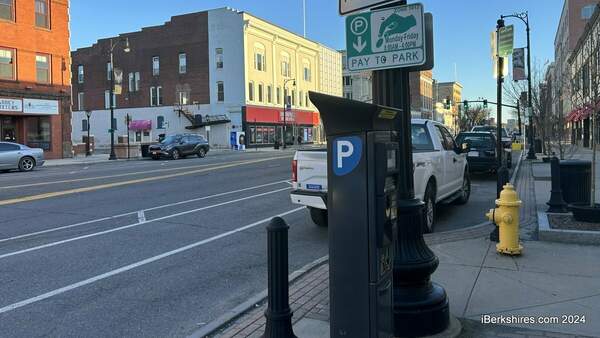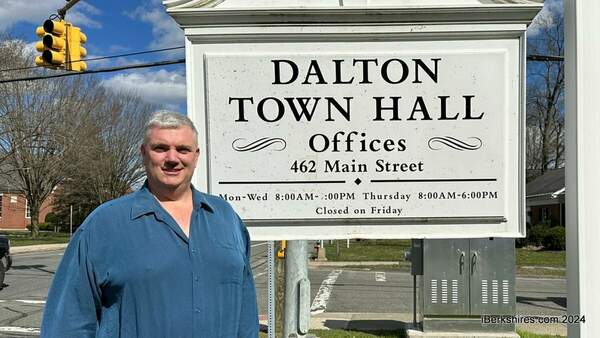Updated October 15, 2014 10:44AMPittsfield Council Upset With Process of Health Insurance Switch
 Adam Thornton explained the plans Blue Cross Blue Shield is offering the employees. Adam Thornton explained the plans Blue Cross Blue Shield is offering the employees. |
Updated: Wednesday, October 15, 2014 at 10:45 a.m. with comments from the PEC about their role in informing the unions about the proposal.
PITTSFIELD, Mass. — The City Council is upset that the mayor did not include them in negotiating new health insurance plans for employees.
"That is an unacceptable breach of protocol and respect for the City Council," said Ward 5 Councilor Jonathan Lothrop.
The city's Public Employees Committee, which is made up of representatives of the city's 15 workers unions, voted to switch from the Group Insurance Commission to Blue Cross Blue Shield.
Mayor Daniel Bianchi said the switch came after negotiations between the city, the PEC and the health insurance company throughout the summer. Bianchi estimates that the move will save taxpayers $1.5 to $2.5 million.
"This was independently approved as a good proposal and one that would save the city conservatively between $1.5 and $2.5 million," the mayor said.
The actual comparison of savings is dependent on which options the employees choose. The City Council wasn't part of those negotiations and they say they should have been.
"I believe we should have had a vote. That is my opinion," Lothrop said.
The switch started with the unions voting down a change. Bianchi says Blue Cross then countered with another offer, which led to a long negotiation. In September the union representatives voted in favor of the newly crafted plan the two sides hammered out.
According to PEC Vice Chairman Brendan Sheran, the PEC held six open sessions throughout the process for the bargaining units to understand the change. He said while not every bargaining unit attended, the group "made a really serious effort to inform our people."
But many of the union members felt they weren't well informed by their representatives on the board. On Tuesday, a few city employees used the open microphone period to say the vote was taken in haste with them only finding out about the issue the Friday before the Monday vote.
The sides reached agreement the week before the vote and then councilors began fielding phone calls from employees concerned about the change.
"It is concerning to me that my first awareness was a constituent e-mail on Sunday morning, the day before the vote was taken," Lothrop said.
Vice President Christopher Connell said he is supposed to be a "buffer" between the administration and constituents and when he got the calls, he didn't know what to tell them. Ward 3 Councilor Nicholas Caccamo said he is a member of the GIC and didn't know about the change.
"It is clear that there is not a working relationship with the City Council and the mayor," said Ward 6 Councilor John Krol.
The council voiced concern about the contract. Adam Thornton of Blue Cross Blue Shield outlined the plan to the City Council. The plan is specially tailored to the union's wants.
"There are many benefits in our plan that will save out-of-pocket costs for our members," he said.
Massachusetts Interlocal Insurance Association Vice President Joseph Callahan also supported the claims that the city will see a savings of more than $1.5 million.
"The majority of employees will save an average of $264 annually," he said.
According to Bianchi, one of the negotiating points was that some who chose a certain plan would actually pay extra. The mayor says a mitigation fund is being created to help those employees offset their costs.
"We think we have a very good safety net for those who could be harmed," Bianchi said.
Despite the mayor and MIIA's reassurance, Lothrop said he is worried about what will happen in the future.
In year two there is a cap of 5.3 percent the rates can raise but nothing dictates the cost after that. In year three, the city has no option to go back to the GIC nor in year four would anyone know the Blue Cross rates at the time the city would have to commit to going back to the GIC.
"In year three, we have no idea what this is going to cost," he said.
Mark Meunier, director of government programing for MIIA, said he understands the concern but reassured that MIIA will be looking out for the city's cost.
"This is what we do. We have an entire dedicated unit to work with municipalities," he said.
The mayor defended the process, saying the unions were involved throughout the process. It is the representatives who are responsible to act on the union's behalf and their responsibility to inform their members.
However, the councilors rejected that notion, citing a long process and a City Council vote that led to joining the GIC.
Details of Blue Cross Blue Shield's plan is available below.
BCBS Pittsfield 2014 Benefit Comparison
 Adam Thornton explained the plans Blue Cross Blue Shield is offering the employees.
Adam Thornton explained the plans Blue Cross Blue Shield is offering the employees.














